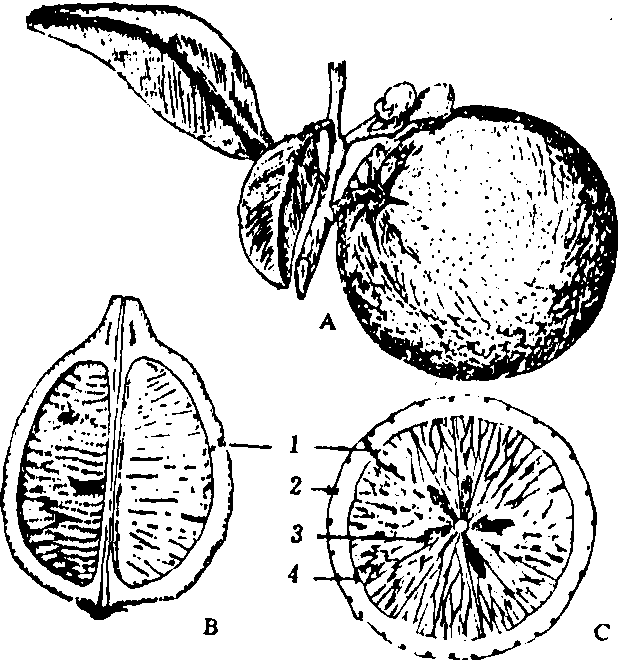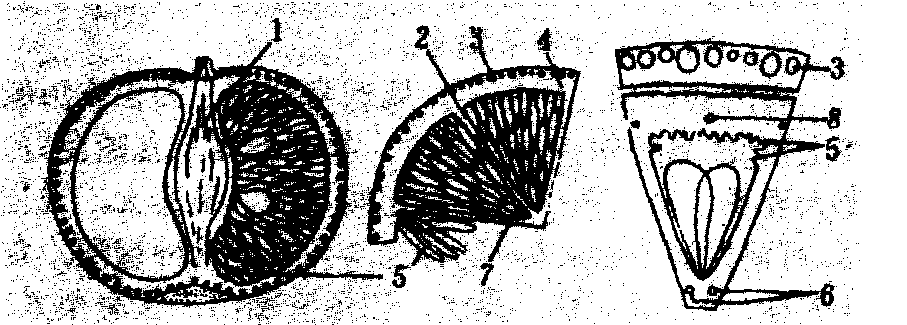柑果ganguo
又称橙果。浆果的一种类型,由多心皮具中轴胎座的子房发育而成。外果皮坚韧革质,有很多油腺,中果皮疏松髓质,有维管束分布其间,干燥果皮内的“桔络”就是这些维管束。内果皮膜质,分为若干室,室内充满含汁的长形丝状细胞,是原来子房内壁的表皮毛发育而成。这是果实的食用部分,如柑、橙、桔、柚等的果实。

图37 桔类的柑果
A. 果实外形 B. 果实的纵切面 C. 果实的横切面
1. 外果皮与中果皮 2. 油腺 3. 种子 4. 内果皮
柑果hesperidium
由多心皮上位子房形成的多瓣肥大的肉质果。其构造由外向内依次为橘皮、橘络、橘瓣、中心柱(见图)。
甜橙的柑果
左. 成熟果纵切面; 中. 成熟果横切面; 右. 成熟果切面1. 中心柱; 2. 室隔; 3. 油腺; 4.橘皮; 5. 汁囊;6. 侧生心皮束; 7. 种子; 8. 中央心皮束
橘皮, 包括外果皮和大部分中果皮。二者界限不明显, 并互相交错。外层橙黄色组织是外果皮, 其最外层是由排列紧密的含油泡的细胞层构成,含有色素。幼果时, 细胞中含叶绿体, 成熟时,转变为有色体,果皮逐渐褪绿变为橙黄或橙红色, 称为黄皮层。橘皮内层白色海绵状组织是中果皮, 称海绵层。橘皮的厚薄和剥离的难易, 因树种、品种而异。枸橼、柠檬、柚、酸橙等, 皮厚难剥; 甜橙, 皮中厚,难剥; 宽皮橘、㰀檬等, 皮较薄, 易剥; 金橘属果皮薄脆可食。
橘络, 是海绵层和囊瓣之间稀疏分布的网络状组织, 是中果皮的延伸, 由维管束和通气组织形成。
橘瓣, 围绕中心柱而生。由内果皮的内表皮层和几层薄壁组织形成。每个心皮形成1个橘瓣。心皮数因树种、品种而异, 柑橘属8~18个, 金橘属2~7个,枸橘属6~8个, 各心室之间的隔膜是中果皮和内果皮组织的延伸。橘瓣分离难易因树种而异,橘易橙难,柑居中。橘瓣内部包含汁囊和种子。汁囊为食用部分,由橘瓣中的内表皮层的突起形成,为多细胞棒状结构。开花时汁囊开始发育, 一直持续至花柱凋萎。汁囊内含汁液及色素, 幼果时含叶绿体,成熟前转变为有色体,因而颜色由绿逐渐变淡, 最后呈橙黄或橙红色。
中心柱, 由果柄延长直至果顶, 纵贯上下, 并与各橘瓣胎座附近组织联合在一起, 主要包括轴干维管束。此束在子房基部向周围分出一轮心皮, 其数目依心皮数而定。每一心皮有3条主要维管束, 包括1条中央心皮束和2条侧生心皮束。并由心皮束分出许多支脉, 遍布全果。
种子着生在橘瓣内紧靠中心柱处。种子数与树种、品种有关。柑橘属每心室有胚珠4~12个, 枸橘属4~8个。部分胚珠发育成种子, 有的种子多达百粒以上,如柚; 有的胚珠大部或全部败育,形成少籽或无籽果,如南丰蜜橘、温州蜜柑、华盛顿脐橙等。种子的含胚数及胚的颜色也因树种、品种而异, 如柚、枸橼为单胚, 胚白色; 橙、柠檬为多胚, 胚白色; 橘一般多胚,少数品种单胚, 胚绿色。多胚者只有一个有性胚, 其余为珠心胚。
柑果hesperidium
柑橘类植物特有的一类肉质果。由复雌蕊具中轴胎座的上位子房发育而来。外果皮厚,外表革质,内部分布有许多油腔;中果皮较疏松,具多分枝的维管束;内果皮膜质,分隔成若干囊瓣,其内产生许多多汁的毛囊,为食用的主要部分。

酸橙的柑果横切面
1.外果皮 2. 中果皮 3. 内果皮 4. 种子 5.毛囊